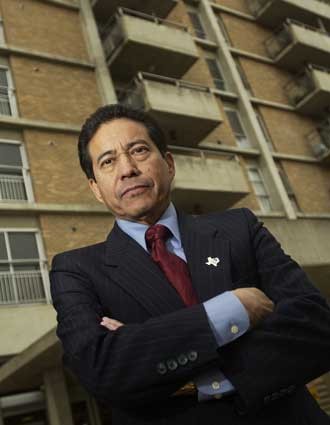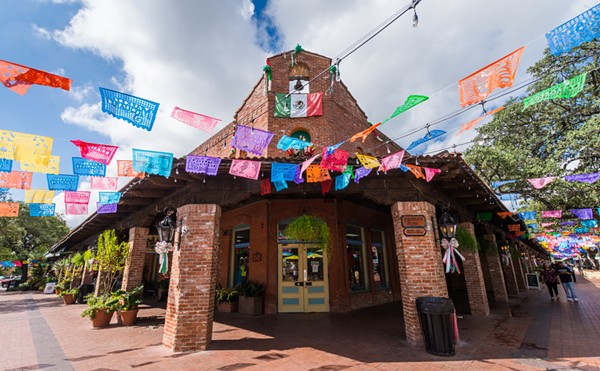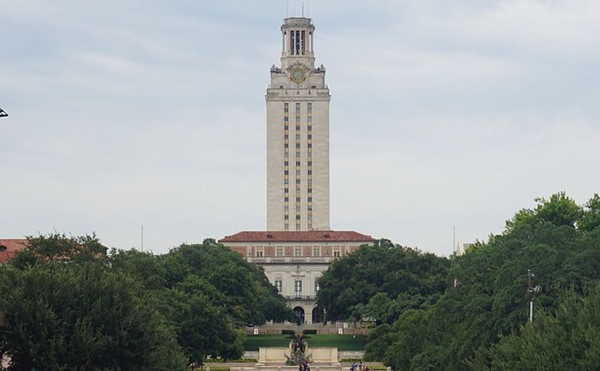LULAC accuses the housing authority of mishandling a rape case
The Current has changed the name of the rape victim, a SAHA resident, to protect her privacy.
Like a modern-day Don Quixote, George Alejos has again taken up the pen to charge the San Antonio Housing Authority with misconduct, this time on behalf of a 63-year-old resident. In 2004, Estella Rodriguez was raped and beaten in her Victoria Plaza apartment, a SAHA complex. Today, members of her family believe SAHA owes Rodriguez a safe, quiet house and financial remuneration for her pain and suffering.
| George Alejos, affordable housing director for LULAC stands outside the Marshall Apartments. (Photos by Mark Greenberg) |
In letters dated July 31 and November 30, Alejos, LULAC's affordable housing director, states that he is writing on behalf of Rodriguez. He alleges that SAHA ignored Rodriguez' pleas to be relocated after she was attacked in her apartment, and that it acted under "false pretenses," and perhaps illegally, in paying Rodriguez $500 to sign a waiver relinquishing her right to seek damages as a result of that attack.
"The waiver is fraudulent because it was `signed` under duress," Alejos says. "They used the money to get her to sign waiver. If `CEO Henry Alvarez` was aware of and ordered and approved that payment, then he needs to answer to that."
In August 2004, Rodriguez was living at Victoria Plaza. One evening, Alejos says, a minor, who was visiting his father, also a resident, knocked on Rodriguez' door asking for a cigarette. According to Alejos, when Rodriguez said she didn't have one, he allegedly forced his way into the apartment, then beat and raped her. According to Alejos, the minor has since been convicted. `The Current was unable to obtain a police report because the case number is unknown to Alejos or Rodriguez' daughters, and in rape cases, the San Antonio Police department does not allow victim information in report searches.`
After the attack, Rodriguez' daughters, Rebecca and Susie, requested an emergency transfer for Rodriguez. "My mom was really unhappy at Victoria Plaza," says Susie. "She `wanted` a house instead of an apartment, but SAHA said she could only transfer to a senior citizens' building. I thought there might be other programs, but I didn't know what steps to take."
"We were pressuring SAHA to move her and nothing was happening," says Rebecca, "but after Mr. Alejos wrote SAHA, they moved fast, and they moved her where they wanted."
Yet, SAHA records indicate that between September 2004 and November 2005 the housing authority showed Rodriguez and her daughters five apartments in the downtown area and near San Antonio College. Rodriguez twice accepted apartments and then declined to move, once because she was reportedly too ill. "We went to see two apartments," says Rebecca, "but they were in the projects; they were way worse than Victoria Plaza."
"We worked with Ms. Rodriguez continuously and showed her as many as five units, all of which she declined until this recent move to Villa Tranchese," says Melanie Villalobos, SAHA corporate relations director. "She was eligible for elderly or family units, but location preference makes it difficult."
In November, Rodriguez moved to Villa Tranchese, near San Antonio College. Although Rodriguez' daughters say she was unhappy at Victoria Plaza and SAHA records indicate that she accepted the apartment, Rodriguez says it was not her choice to move. "SAHA asked me to move for no reason, I never bothered anyone," she says. "Even though they were in terrible condition and ugly, the commodes were better at Victoria Plaza."
Her daughters are not happy with Villa Tranchese, either. Rebecca says that SAHA did not give Rodriguez' family the opportunity to choose the apartment, which is farther from Rebecca's home.
Rebecca says that although she knew her mother was moving, it happened so fast that neither she nor her family knew which apartment Rodriguez had taken at Villa Tranchese. She says this caused the family to lose track of their mother for two weeks, but she also admits that at no time during that period did she call SAHA to get the information.
Neither of the siblings has legal guardianship of their mother, but both assert that one of them should have been present on August 17 when Rodriguez accepted $500 in return for signing a general release discharging SAHA for injuries she may have received in the incident at Victoria Plaza. "She doesn't know what she is signing ... they told her it was a lease," says Rebecca.
Furthermore, she says she discovered the waiver only after Alejos asked SAHA for her mother's file. "Mr. Alejos told me. I'm glad he's my landlord, otherwise we would not have known." Alejos is the property manager for Rebecca's house; his sister is the property owner.
Rodriguez says she does not remember what the $500 was for, "I have no idea, that was five or six months ago," she says. "I have no money at all. Pennies in my purse - no way to visit my daughters, no way to even bathe myself." (Rodriguez lives on a monthly $579 Supplemental Security Income check.)
In Rebecca's recollection, her mother was moved, at SAHA's expense, a few days after receiving the money. However, according to SAHA records, in August, after the waiver was signed, Rodriguez declined to move into the Parkview Apartments because she was sick. The move to Tranchese came two-and-a-half months after Rodriguez signed the waiver, but SAHA confirmed that it paid for the move.
"She had no business signing a waiver without LULAC's knowledge." says Alejos. "After I wrote the letter `in July`, `SAHA` knew they were supposed to come through me now."
According to Roger Enriquez, a UTSA criminal justice professor, signing a release of liability is akin to settling the claim through a contract. Courts of law may refuse to enforce "unconscionable" contracts if doing so goes against public policy. To determine if a contract is unconscionable, the court would consider several factors: the "entire atmosphere" in which the agreement was made; the alternatives, if any were offered to the parties at the time the contract was made; the "non-bargaining ability" of one party; whether the contract was illegal or against public policy; and whether the contract is oppressive or unreasonable.
"If a court finds that the release executed by SAHA was unconscionable, then it is unenforceable," explained Enriquez in an email. "Given `the facts as presented,` it seems plausible that a court would have little difficulty reaching the conclusion that the release is unconscionable under these circumstances."
Alejos and Rebecca plan to petition SAHA for a two-bedroom house for Rodriguez, so that Rebecca's 18-year-old daughter can move in with her grandmother and take care of her. Rodriguez says she would like some peace. "I don't want no one to molest me, or knock on my door," she says. "I think a house would be good, I've always liked privacy." •
By Susan Pagani


















